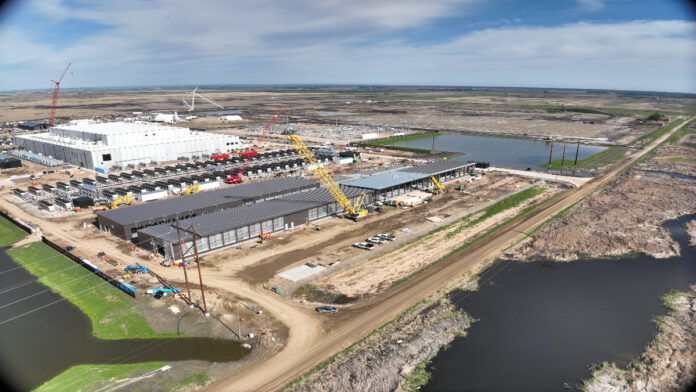ABB said the new design reduces cabling, improves reliability and enhances energy efficiency
In sum – what to know:
Partnership on AI infra – ABB and Applied Digital will co-develop energy-efficient power systems at the latter’s 400 MW greenfield AI campus in North Dakota.
Medium-voltage UPS boosts scale – ABB’s HiPerGuard enables 25 MW block expansion with fewer components and improved reliability.
Efficiency for AI power loads – The design cuts heat and losses to meet the rising energy demands of AI data centers.
U.S.-based developer of advanced data centers Applied Digital has announced a new infrastructure partnership with Swiss electrification and automation company ABB with the main aim of supporting the growing demands of artificial intelligence (AI).
ABB noted that the new collaboration centers around Applied’s 400 MW greenfield campus in North Dakota, where both companies expect to develop energy-efficient power systems.
At the heart of the partnership is ABB’s HiPerGuard medium voltage static uninterruptible power supply (UPS) system. Unlike traditional low-voltage UPS systems, this medium-voltage approach allows data centers to scale in larger 25 MW blocks, ABB said. The design reduces cabling, improves reliability and enhances energy efficiency — key benefits as AI workloads increase power demands across the industry, the Swiss company added.
The Swiss company also explained that the partnership includes full design and development of the electrical infrastructure for the site. Early equipment orders were placed in late 2024 and early 2025. Financial details were not disclosed.
Massimiliano Cifalitti, president of ABB’s smart power division, said: “ABB’s medium-voltage UPS system helps AI data centers shrink their electrical footprint while increasing performance.”
Todd Gale, chief development officer at Applied Digital, added: “This partnership is changing how large-scale data centers are built. ABB’s global expertise and technology give us a new blueprint for powering AI factories.”
AI data centers are the backbone of modern machine learning and computational advancements. However, one of the biggest challenges these AI facilities face is the enormous power consumption they require. Unlike traditional data centers, which primarily handle storage and processing for standard enterprise applications, AI data centers must support intensive workloads such as deep learning, large-scale data analytics as well as real-time decision-making.
AI workloads, especially deep learning and generative AI models, require massive computational power. Training models such as GPT-4 or Google’s Gemini involves processing trillions of parameters, which requires thousands of high-performance GPUs (Graphics Processing Units) or TPUs (Tensor Processing Units). These specialized processors consume a lot more power than traditional CPUs.
The hardware used in AI data centers is also more energy-intensive than standard computing equipment. GPUs, TPUs and FPGAs (Field Programmable Gate Arrays) are specifically designed for parallel processing, but this efficiency comes at the cost of huge energy demands. Despite their massive energy demands, the industry is actively working on solutions to reduce AI data center power consumption.
In March, ABB launched a generative AI solution to preserve domain knowledge within industrial enterprises, which is vanishing as technicians retire and are not replaced, and to contribute to new digital operations that drive efficiencies and attract younger workers. The new product, called Industrial Knowledge Vault, will “safeguard expertise and empower workforces,” the Swiss firm said.
It was developed by ABB with Microsoft. It uses ABB’s Genix CoPilot and Microsoft’s OpenAI platform, integrated for enterprises to code and train sundry of its AI models (o3-mini, o1, o1-mini, GPT-4o, GPT-4o mini, GPT-4 Turbo, Vision) via a REST interface on its Azure cloud stack. It can store, analyze, synthesize and transform industrial knowledge into “conversational” step-by-step assisted workflows, offering “actionable procedures” — so businesses can also “run leaner while preserving safe operations,” it said.

